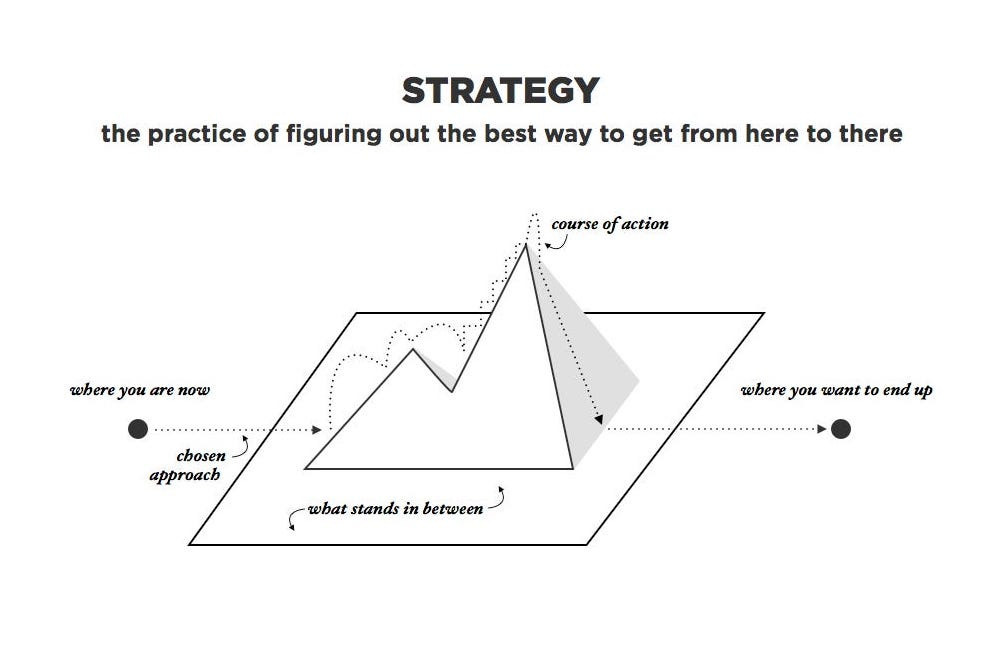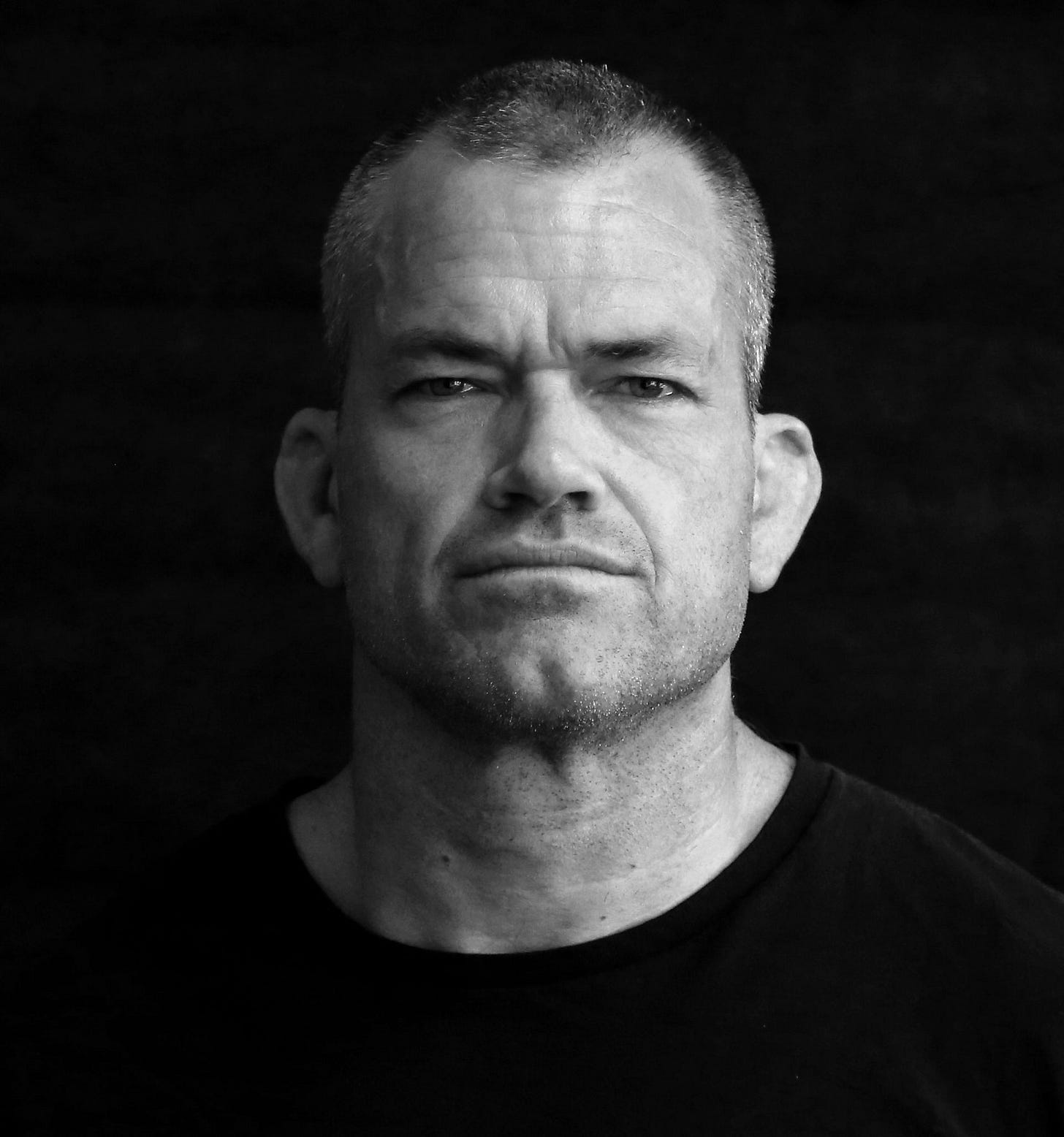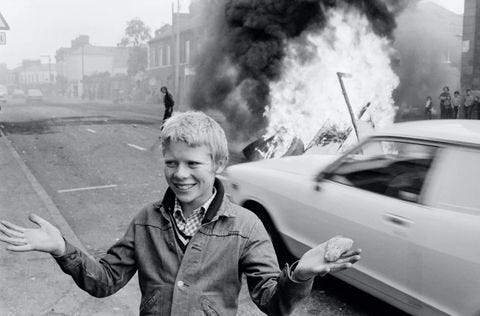Hi Move Fast, Think Slow readers! Last week we dove into some stoicism wisdom on rest, two great podcasts that are worth a deep dive listen, and some running notes.
This week, we’re going to dive into Missions, why they’re a power move, and how they’re beneficial to teams, organizations, and personal journeys. I think if humans established clear-cut missions that were honored on a ritualistic basis as a guide towards establishing processes, standards, behaviors, and analysis, then both people and organizations would be a lot more fulfilled. And at Move Fast, Think Slow, we’re all about exploring how to see this journey we call life can be more half-full than half-empty. Let’s dive in!
SIMPLICITY IS POWER

Working at an ad agency often involves solving an issue on behalf of a client, and teams will huddle in a room to tackle the problem. Sometimes people can find themselves running in circles, trying to nail down the right answer for the task at hand.
In that moment, I will ask, what are we ultimately trying to achieve? What does success look like?
And often, the answer to that question is quite simple. And this reminds me of this quote from a notable Prussian General:
“Simplicity in planning fosters energy in execution. Strong determination in carrying through a simple idea is the surest route to success. The winning simplicity we seek, the simplicity of genius is the result of intense mental engagement.” - Carl von Clausewitz, a Prussian general and military theorist
The mission tends to be simple, but identifying what that mission might need to be is where the work sits. But you can’t get to the simple answer if you don’t know what the end game needs to look like. This brings me to the theme of this week’s newsletter: WTF is your mission?
FIRST, WTF IS A MISSION?
You know what a mission is, but let’s clarify for clarity's sake.
A mission is a specific task, duty, or purpose that an individual or group sets out to accomplish. It can refer to:
A goal or objective with a defined purpose
An important assignment, often given by an authority
An organized expedition, especially for exploration or scientific research
A diplomatic or military operation
In business, a statement that defines an organization's core purpose and focus
Missions can vary greatly in scale and complexity, from personal goals to large-scale endeavors involving many people. They typically involve a clear aim, a plan of action, and often a timeframe for completion.
Most organizations have them, but most of them forget what they are. This is because most organizations are caught up with ego, the ethos of a get-rich-now mentality, even though our economy grows at a 2%-3% clip per year. And the thing is this: mission-based organizations 9/10 outperform transactional-driven companies (more on that below).
Most humans don’t have missions for themselves. Most humans have chores, jobs, duties, etc., but the majority of people out there have never set a mission for themselves. Yet, having a mission and understanding what it is and why you have it can unlock a new superpower.
JOKO’S WARRIOR WISDOM: COMPLETE THE MISSION & BE RELENTLESS
If you haven’t seen Joko Wilink on your social feeds, let me tell you a bit about this badass. After leading the charge for 20 years in the Navy Seals, he has spent his post-military life sharing with others how they can use the insights and mindsets he brought forward to create successful teams in the Navy Seals.
In his book DISCIPLINE IS FREEDOM, Joko discusses the importance of defining a mission and how it is never complete.
"Something that I saw in combat and later tried to train out of soldiers was the tendency to relax once the primary objective of a mission was complete. I tried to train that out of them because you can’t relax until the entire mission is complete.
That’s why in training, we always attacked platoons even harder after they left their main target, once platoons were patrolling back to base, when their minds had already gone home and “turned off.”
That’s when we would bring it to them and cause all kinds of mayhem. Because then they would develop the muscle memory to keep going until the end. And when they got back to base, we would re-task them so they had to begin planning (the next mission) again. It wouldn’t stop. That’s the mentality I wanted to instill in them:
It is never finished.
You always have more to do.
Another mission. Another task.
Another goal.
And the enemy is always watching. Waiting. Looking for that moment of weakness. Looking for you to exhale, set your weapon down, and close your eyes, even just for a moment. And that’s when they attack. So don’t be finished.
Be starting. Be alert. Be ready. Be relentless.
I love this so much.
Because it is so right.
LIFE IS A BATTLEFIELD
The call to action to set a mission might overwhelm some, but that’s not the point.
The point is the enemy is watching.
The enemy is waiting for you to put down your weapon.
And that’s when they will beat you.
That’s not just true in war. A situation that’s literally life or death.
It’s true in all of our lives.
Life is a battlefield.
And if you want to get more out of it, you have to know what your mission is.
And then, you need to focus on how you’re going to improve it.
HERE’S THE THING ABOUT MISSIONS
Missions clarify.
Missions set forward purpose.
Missions give us something to gauge day in-day out.
That’s the thing about getting yourself over there to that next destination.
You can only get there if you actually think about it with intentionality.
And living a good life has a whole lot to do with living with intentionality. That’s one of the perks.
Because if you have intentionality, it means you’re paying attention. And if you’re paying attention, the odds are typically be in your favor and you better yet, you notice the little magical things (and big ones) that much more.
And better yet, going on that journey, the journey in itself, is the great blessing of life. The fact that we even get to climb is huge deal. How lucky are we?
BTWs BEZOS LOVES MISSION-BASED COMPANIES OVER THE REST
“Right after World War II, Akio Morita—the guy who founded Sony—set as the mission for Sony that they were going to make Japan known for quality. You have to remember, this was a time when Japan was known for cheap, copycat products. And Morita didn’t say ‘we’re going to make Sony known for quality’. He said ‘we’re going to make Japan known for quality.’ He chose a mission for Sony that was bigger than Sony.”
“When we talk about earth’s most customer centric company, we have a similar idea in mind: we want other companies to look at Amazon and see us as a standard-bearer for obsessive focus on the customer—as opposed to obsessive focus on the competitor.” - Jeff Bezos, 2009
“I strongly believe that missionaries make better products. They care more. For a missionary, it’s not just about the business. There has to be a business, and the business has to make sense, but that’s not why you do it. You do it because you have something meaningful that motivates you.”
You have something meaningful. That’s what everyone wants. On an organizational level, everyone wants some sense of purpose, camaraderie, and clarity on where the group is going and why.
It was a superpower for Bezos/Amazon, but I think the majority of companies fail at establishing a clear mission or if they have one adhering to its principles. That’s why so many companies are flat-out buzzkills. When it’s just about economics and the transactional, that’s not optimizing what companies can be or what humans want to hear to bring their best, then you’ll get average team members who are marginally at all motivated to reach new heights.
SET IT, TRACK IT, AND MODIFY IT
At Pixar, it was “story is king,” and the other principle was “trust the process.” In Ed Catmull’s book (CREATIVITY INC.) he goes on to tell us how that drove everything they did but over time they were flexible enough to pressure test it. To modify it. The principles would remain, but the way they’d honor those principles as they moved through their work would shift over time. Ed and his team would collect input on the good, bad, and ugly aspects of how they brought new stories to life for the big screen. And along the way, they found a groove that they have continued nearly 40 years later.
LITTLE THINGS LEAD TO BIG GAINS
I’ve written about it ad nauseam on MF/TS, echoing James Clear's wisdom that the little things add up to the big thing. Your big gains don’t come in one fell swoop. Your big gains come from a lot of little things adding up. And what better way to do that than by staying loyal to the mission at hand daily?
Because you always have more to do.
And I’d argue you should have a mission because you are worth it.
You are worth taking that seriously.
We have one life to live.
Are you going to sleepwalk through it?
Or are you going to set out on a mission to learn things about yourself that you never knew could be true? Are you going to set out a mission for yourself so you can live your life with a bit more intentionality tomorrow than you have today?
The choice is yours.
IMAGES OF THE WEEK
Go forth.
Stay safe.
Ride the wave.
-Mitch







